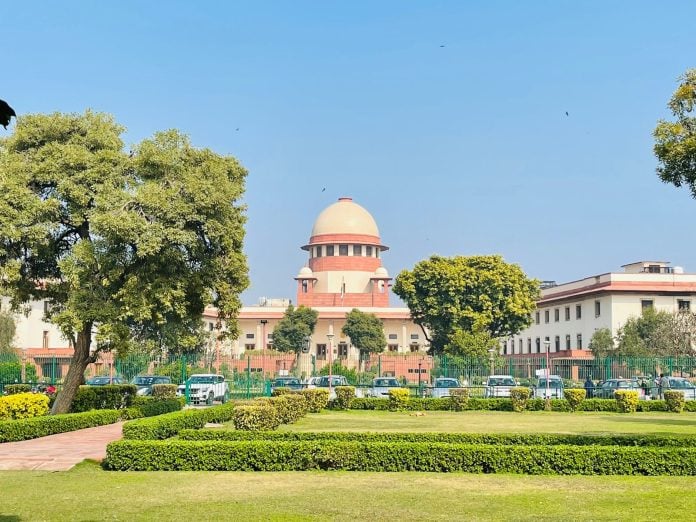The Supreme Court has set aside the Jammu and Kashmir High Court order, which had earlier deprived the protected witness statements in the case of Waheed Para, who had approached the top court of the country for access to the statements of witnesses.
The High Court had stayed the trial court order that had directed the prosecution to provide Waheed Para the statements of protected witness after expunging their identity for effective defence of the case.
The Jammu and Kashmir High Court had denied Waheed Para the witness statements for conducting his trial before special NIA Court Srinagar.
An appeal for restoring the earlier trial court dated 11.09.2021 and the High Court order 11.10.2021 to be declared void was filed in the Apex Court.
The Division Bench of Justice Sanjay Kishan Kaul and Justice M.M. Sundresh on a conspectus of the legal position and the limited contours of the facts required for determination of the issue, is of the view that the provisions of Section 173(6) of the CrPC read with Section 44 of the UAPA and Section 17 of the NIA Act stand on a different plane with different legal implications as compared to Section 207 of the CrPC.
The Bench said as the first order was passed at the threshold. There was no notice to the accused. The objective of Section 44, UAPA, Section 17, NIA Act, and Section 173(6) is to safeguard witnesses. They are in the nature of a statutory witness protection. On the court being satisfied that the disclosure of the address and name of the witness could endanger the family and the witness, such an order can be passed. They are also in the context of special provisions made for offences under special statutes. These considerations weighed with the trial court while passing the order dated 01.06.2021, and even the appellant has no quibble with the same.
Also Read: Allahabad High Court summons SP Cyber Crime Lucknow in bank fraud case
The Bench observed that occasion for the appellant/accused to come in and seek redacted statements under Section 207 of the Cr.P.C. arose when the trial was to commence and the appellant was of the view that in order to plead an appropriate defence there should be full disclosure minus the redacted portion so that the testimonies of those witnesses could be utilised without disclosing their identities or their place of residence.
This is not, in the view of the Court, an exercise of the power of review but the exercise of powers at two different stages of proceedings under two different provisions. The plea of the prosecution of this being a review power is, thus misplaced. There is no doubt that the power of review is not available with the trial court and the question was whether the exercise of the power by the trial court under the two separate provisions vide orders dated 01.06.2021 and 11.09.2021 can at all be said to be the power of review in the latter order.
“The answer to this is clearly in the negative We may also note another aspect arising from there being no appeal against an interlocutory order. This aspect somehow has not been dealt with by the High Court possibly because it opined that the latter order amounted to a review of the earlier order. The appellant had not challenged the earlier order dated 01.06.2021 and could not have done so. Similarly the latter order could not have been challenged in appeal by the respondents, being in the nature of an interlocutory order given the provisions of Section 21(1) of the NIA Act”.
Having said so, the Court also came to the order passed by the trial court on 11.09.2021 which has been cautiously worded. The order has not only permitted redaction of the address and particulars of the witnesses which could disclose their identities but has further observed as noted that even other relevant paras in the statement which would disclose their occupation and identity could be redacted. Thus, a wide discretion has been given and that too for the Special Public Prosecutor to take a call. There could thus have hardly been a grievance raised by the prosecution in this regard. On query to the counsel for the respondent as to how this order can in any manner prejudice or have the propensity to disclose the identity of the witnesses or their families with the possibility of harm being caused to them, there has really been no answer, the Court further observed.
The Bench believe that the order dated 11.09.2021 is both fair and reasonable for the prosecution and defence, while protecting the witnesses and not depriving the defence of a fair trial with the disclosure of the redacted portion of the testimony under Section 207 of the Cr.P.C.
Also Read: Supreme Court refuses to quash bail of rape accused, observes it as consensual relationship
“The result of the aforesaid is that the impugned judgment of the High Court dated 11.10.2021 is set aside and the impugned order of the trial court dated 11.09.2021 is restored”
-the order read.
0PDP Youth President Waheed Para was first detained on August 5, 2019, after questioning the Central government’s decision to abrogate the special status of J&K on national television, NDTV. He was arrested under Section 107 of CrPC. On November 25, 2020, Para was arrested by the National Investigation Agency (NIA). In January 2021, he was granted bail by the NIA court.


